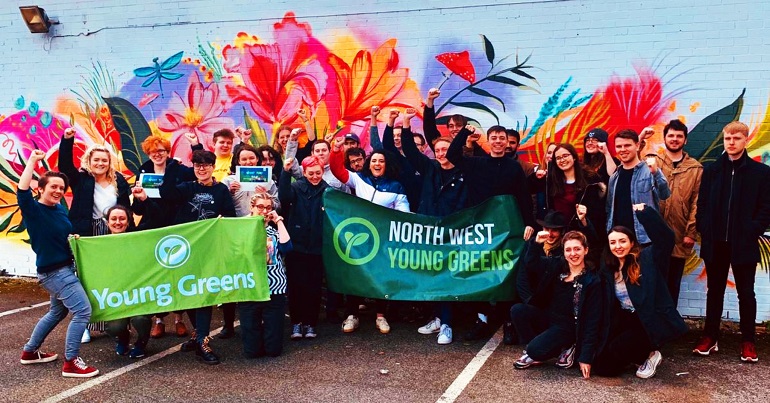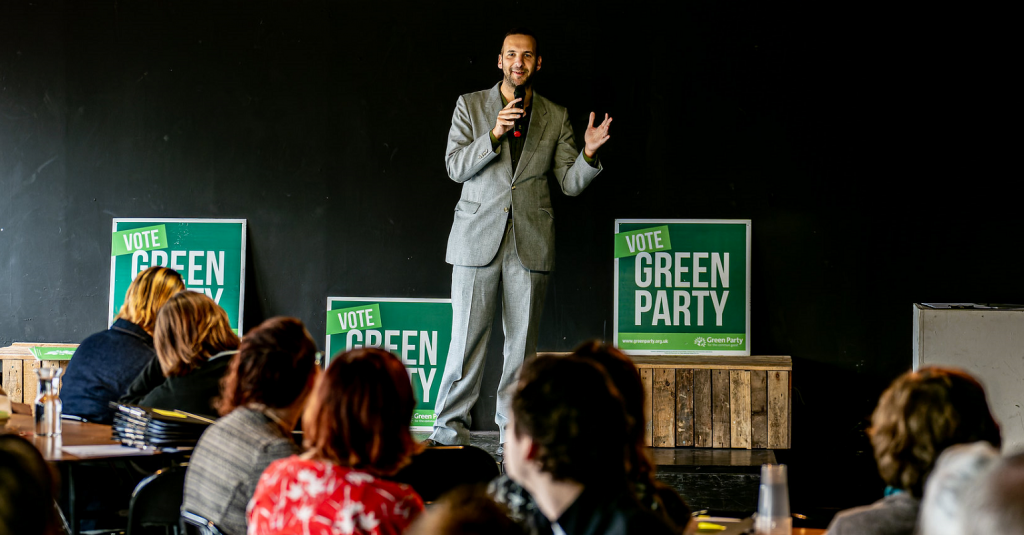The new Green Party leadership needs to put forward a vision which is socialist to its core

The Green Party has a strong track record on standing up for the rights of young people and students. From calling for the scrapping of tuition fees, to the commitment to improving workers rights, Greens have demonstrated an understanding of the challenges facing young people today, and have the skills, vision, and ambition to find creative solutions.
The impact of the pandemic has shone a harsh light on the fragility of our neoliberal socioeconomic model, and young people – and all those left increasingly vulnerable as a result of 10 years of Tory tyranny – are amongst those who are heavily impacted. With the Greens’ influence rapidly growing across the country, young people and students are looking to the next Leader or co-leaders of the Green Party to champion our rights. We want them to take strong, principled stances in the face of a government determined to strip them from us, and to project a vision of the radical transformative change we so desperately need if we are to deliver for people and for the planet.
The Young Greens have long recognised that social and environmental justice are intrinsically linked and that we can only provide transformative change through this lens. In accepting this, it is crucial that the Green Party advocates for an economic system which is explicitly anti-capitalist; an exploitative economic system is fundamentally incompatible with a sustainable planet, and places profits over people in the name of infinite growth. It was reassuring to see all candidates at the first national Green Party hustings agree that the Green Party is fundamentally anti-capitalist. In March 2020, the Young Greens delivered an unprecedented programme of political education, that centred on an ecosocialist anti-capitalist vision. Young people and students have experienced the results of neoliberal capitalist ideology, whether that be from a government which continues to put profit over public health, or on university campuses, where education is treated as a commodity, and students as customers. Underpinning our new leadership’s messaging must be a commitment to transforming our corrupt economic system, which is failing at every turn, and putting forward a vision which is socialist to its core.
Students have been looking for a political home where they can make and influence change. A place where they can trust their political leads to demand justice for students. The Green Party is poised to take this place with a deep-rooted history in social movements that leads back to student protests. This year, we’ve seen a resurgence in student activism that stands up to exploitation and shameless profiteering. The Young Greens have led the way, standing in solidarity with rent strikers across the country, and continuing our calls for tuition fees to be scrapped. Meanwhile, this government’s agenda of limiting democracy targets student unions, and the futures of many humanities degrees in the UK hang in the balance. All of this is representative of a broken model of marketisation within education, and a government determined to strengthen it. Students are looking to the Greens to act in solidarity with them, to fight for the democratisation of higher education, and to support the grassroots organising happening on campuses across the country.
Radical ideas often start in the student movement and are rooted in collective liberation, as are Green values. More than ever, we need a leadership which prioritises liberation politics, placing it at the heart of our party, and our policy. It would be naive to ignore the context of this leadership election, and the reason why the second of the incumbents is not re-standing. Creating a party where everybody is welcome, feels safe, and is able to fully engage and participate is crucial to building a truly inclusive movement, shedding our image as a party of the white middle-class in a way which is authentic, and actively seeks to centre a decolonial vision of liberation politics.
The Young Greens have led the way, working collaboratively with liberation groups both within the Green Party, and within our own structures, to pass motions at Convention setting out clear guidance on antisemitism, and pledging to support LGBTIQA+ young people, with a specific focus on trans liberation. This year, liberation officers have been introduced to our Executive Committee, to centre the voices of traditionally marginalised communities in all of our work, and to progress our fight for collective liberation. The next Green leadership must work closely with liberation groups in the Green Party, to foster a platform and party which is inclusive, and which has an unwavering approach of placing those impacted by policy at the heart of its creation. Devolving relevant power to liberation groups, whilst empowering them to deliver campaigns, events, and more is vital.
As Young Greens, we recognise the pivotal moment we find ourselves at as the Green Party. With almost 450 councillors on a record number of councils, and an electorate witnessing the devastating impact of the climate crisis, we have an opportunity like never before to present a vision of a society which cares for people and the planet. We can use that vision to get Greens elected, and to build power from the grassroots. The importance of this election cannot be understated; this is why on 7 September, the Young Greens are hosting our leadership hustings, to allow young people and students to put questions directly to the candidates competing to represent us. Hustings are open to all Green Party members, and will take place from 7 – 8:30pm.
We know how important it is that young people are empowered to fully participate in the democratic process: radical democracy starts at home, and we want to offer our membership the chance to make an informed decision this September. Going forward, we look forward to working with whoever is elected to strengthen and progress the Green movement, to put youth and student issues at the heart of the political agenda, and to deliver meaningful, radical change for young people.
PS. We hope you enjoyed this article. Bright Green has got big plans for the future to publish many more articles like this. You can help make that happen. Please donate to Bright Green now.




Well I certainly agree that socialism should be at the centre of the Green vision. Great to read! Surprisingly I am in my sixties!
Very much agree, are you interested in dual power base building approaches? https://bright-green.org/2021/02/21/from-south-wales-to-philadelphia-sewing-the-seeds-of-revolutionary-change/